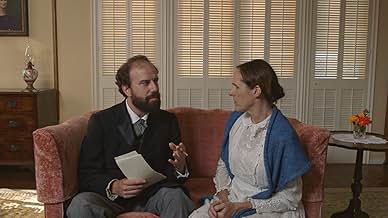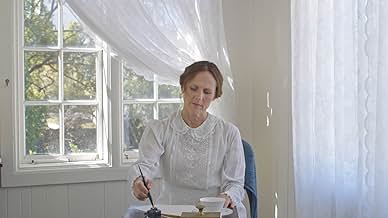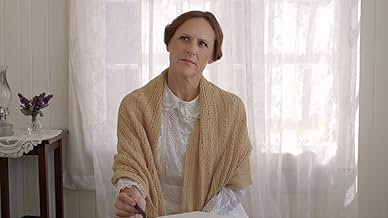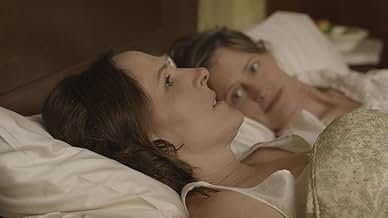AVALIAÇÃO DA IMDb
6,2/10
1,5 mil
SUA AVALIAÇÃO
Adicionar um enredo no seu idiomaDramatization of the little known side of the writer Emily Dickinson's life, in particular, her relationship with another woman.Dramatization of the little known side of the writer Emily Dickinson's life, in particular, her relationship with another woman.Dramatization of the little known side of the writer Emily Dickinson's life, in particular, her relationship with another woman.
- Prêmios
- 3 vitórias e 7 indicações no total
Stella Chesnut
- Mattie Dickinson
- (as Stella Chestnut)
John Peña Griswold
- Young Austin
- (as John Griswold)
Avaliações em destaque
"Wild Nights with Emily" is a biopic of the poet Emily Dickinson, based around what might be called a revisionist account of her life. The film starts from the assumption that traditional literary scholarship has tended to portray Dickinson, wrongly, as a shy, reclusive, virginal spinster whose poems were inspired by unrequited love for men. Its express purpose seems to be to correct this mistaken impression, showing her as a woman who enjoyed many friendships with other women and who had a long-lasting lesbian relationship with her friend Susan Gilbert.
According to this thesis Susan also became her sister-in-law, entering into a lavender marriage with Emily's brother Austin in order to have closer and easier access to Emily herself. (Austin and Susan had children together, so perhaps their marriage might not have been as lavender as the film makes out). The idea of Emily as a shy virgin apparently originated with her first editor, Mabel Todd, who also happened to be Austin Dickinson's mistress, and who after Emily's death expunged all mention of other women- especially Susan- from her work. Mabel's motive was partly to make the poems less shocking, and therefore more saleable in the puritanical climate of late nineteenth-century America, but she may also have been motivated by a dislike of Susan, her rival for Austin's love.
I decided to watch the film when it recently turned up on British television, but unfortunately it does not work very well as a biography. The action tends to jump about between three periods- 1840, when Emily, here portrayed as a beautiful teenager, is falling in love with Susan, the early 1860s, when she is starting to develop as a poet, and the 1890s, after Emily's death when Mabel is campaigning to establish her reputation as a major literary figure. The abrupt switches from one period to another could make the action difficult to follow at times. The timeline does not always accord with the facts of Dickinson's life; in 1840 she would still have been a young child, and in the middle period, when she would only have been in her early thirties, she is portrayed as a rather plain middle-aged woman. I felt that Molly Shannon, 54 at the time, was miscast in the leading role which should have gone to a younger actress.
"Wild Nights with Emily" is the sort of title which you might associate with softcore porn, but the film is not actually pornographic; the nature of the relationship between Emily and Susan is made clear, but there are no explicit sex scenes. The jokiness of the title is not, however, inappropriate, because the film is in many ways a comedy, treating much of Dickinson's life-story in a light-hearted way, even though, from what I have read of her poetry, she seems to have been a rather serious-minded individual. The male characters, in particular are treated as figures of fun, especially an elderly judge who treats us to a summary of that well-known Bronte sisters novel "Wuthering Jane". (He has confused the plot of "Wuthering Heights" with that of "Jane Eyre"). Emily's mentor Thomas Wentworth Higginson, in real life a noted advocate of the rights of women, is here portrayed as comically sexist, treating Emily with patronising condescension.
The film-makers do just enough to persuade me that Emily Dickinson's life, and her relationship with Susan Gilbert, could have been the subject of an interesting film. Unfortunately, what they have made isn't that film. Director Madeleine Olnek said that it was important to include comedy because "some people don't like to be lectured about feminism". She ought to realise that taking your subject-matter seriously is not the same as lecturing people. 4/10.
According to this thesis Susan also became her sister-in-law, entering into a lavender marriage with Emily's brother Austin in order to have closer and easier access to Emily herself. (Austin and Susan had children together, so perhaps their marriage might not have been as lavender as the film makes out). The idea of Emily as a shy virgin apparently originated with her first editor, Mabel Todd, who also happened to be Austin Dickinson's mistress, and who after Emily's death expunged all mention of other women- especially Susan- from her work. Mabel's motive was partly to make the poems less shocking, and therefore more saleable in the puritanical climate of late nineteenth-century America, but she may also have been motivated by a dislike of Susan, her rival for Austin's love.
I decided to watch the film when it recently turned up on British television, but unfortunately it does not work very well as a biography. The action tends to jump about between three periods- 1840, when Emily, here portrayed as a beautiful teenager, is falling in love with Susan, the early 1860s, when she is starting to develop as a poet, and the 1890s, after Emily's death when Mabel is campaigning to establish her reputation as a major literary figure. The abrupt switches from one period to another could make the action difficult to follow at times. The timeline does not always accord with the facts of Dickinson's life; in 1840 she would still have been a young child, and in the middle period, when she would only have been in her early thirties, she is portrayed as a rather plain middle-aged woman. I felt that Molly Shannon, 54 at the time, was miscast in the leading role which should have gone to a younger actress.
"Wild Nights with Emily" is the sort of title which you might associate with softcore porn, but the film is not actually pornographic; the nature of the relationship between Emily and Susan is made clear, but there are no explicit sex scenes. The jokiness of the title is not, however, inappropriate, because the film is in many ways a comedy, treating much of Dickinson's life-story in a light-hearted way, even though, from what I have read of her poetry, she seems to have been a rather serious-minded individual. The male characters, in particular are treated as figures of fun, especially an elderly judge who treats us to a summary of that well-known Bronte sisters novel "Wuthering Jane". (He has confused the plot of "Wuthering Heights" with that of "Jane Eyre"). Emily's mentor Thomas Wentworth Higginson, in real life a noted advocate of the rights of women, is here portrayed as comically sexist, treating Emily with patronising condescension.
The film-makers do just enough to persuade me that Emily Dickinson's life, and her relationship with Susan Gilbert, could have been the subject of an interesting film. Unfortunately, what they have made isn't that film. Director Madeleine Olnek said that it was important to include comedy because "some people don't like to be lectured about feminism". She ought to realise that taking your subject-matter seriously is not the same as lecturing people. 4/10.
On the positive side, there was some interesting information about Dickenson's poetry being "cleaned up" after her death, to blot out things that might suggest "Unnatural Passions". And the secondary leads, Amy Ziegler as the beloved sister in law Susan and Amy Seimetz as the scheming Mabel, were very well acted and created three dimensional characters.
On the negative side, this simply did not work at all as a movie. Going from a play to a movie is often difficult -- think how many times the late great Robert Altman tried it and consistently failed. The characters were inconsistent; the dialog was often stilted and unnatural; the attempts to liven up the poems were appalling. The humor was all over the place, and even when the humor was successfully funny, it seemed out of place.
Molly Shannon as Emily did best when doing funny non-reactions to the universally buffoonish men in the movie. For most other emotions, she did not get them across to me, I'm sorry to say, since I've liked her in the past, as in 'Year of the Dog'.
I wish I had liked it better, but instead I kept wishing it would just end.
On the negative side, this simply did not work at all as a movie. Going from a play to a movie is often difficult -- think how many times the late great Robert Altman tried it and consistently failed. The characters were inconsistent; the dialog was often stilted and unnatural; the attempts to liven up the poems were appalling. The humor was all over the place, and even when the humor was successfully funny, it seemed out of place.
Molly Shannon as Emily did best when doing funny non-reactions to the universally buffoonish men in the movie. For most other emotions, she did not get them across to me, I'm sorry to say, since I've liked her in the past, as in 'Year of the Dog'.
I wish I had liked it better, but instead I kept wishing it would just end.
After watching this irreverent yet sincere tribute to poet Emily Dickinson, I had the urge to revisit Julie Harris in "The Belle of Amherst". Call me Old School, but I vastly prefer serious filmmaking to the facetiousness of this feature-length SNL sketch approach.
Certainly SNL alumna Molly Shannon as Emily and Susan Ziegler as her sister-in-law, who share the love that dare not say its name in this version of the Dickinsons story give amusing and often moving performances, but the film has no consistent style or tone, and the male characters are predictably straw men mocked for the self-centered Male Superiority attitudes. Even the movie's unreliable narrator, Mabel (Emily's posthumous editor), well-played by Amy Seimetz, is written with such a heavy hand by filmmaker Madeleine Olnek as to lose substance.
Set in 3 different time frames: 1860 for the main story, 1840 for the young Emily and Susan played by disconcertingly lovely actresses Dana Melanie and Sasha Frolova, and Mabel's current era after Emily's death, wherein she pontificates to packed audiences inflating her role in championing Dickinson's career, the movie unfolds in disconnected scenes, many of which might easily have been dropped for sheer dullness, and a couple of which (surreal in nature) clash with the matter-of-fact overall style. Unlike the usual exaggerated beauty of period movies, typified by everything from Merchant-Ivory classics to Kubrick's "Barry Lyndon", Olnek presents the show as if in a low-budget amateur dress-up production representing 2019.
Use of poetry on screen in subtitles as it is recited (and sometimes by itself) recalls Jim Jarmusch's recent use of same in "Paterson", a techinque I found artificial and forced, just as it seems here too.
Certainly SNL alumna Molly Shannon as Emily and Susan Ziegler as her sister-in-law, who share the love that dare not say its name in this version of the Dickinsons story give amusing and often moving performances, but the film has no consistent style or tone, and the male characters are predictably straw men mocked for the self-centered Male Superiority attitudes. Even the movie's unreliable narrator, Mabel (Emily's posthumous editor), well-played by Amy Seimetz, is written with such a heavy hand by filmmaker Madeleine Olnek as to lose substance.
Set in 3 different time frames: 1860 for the main story, 1840 for the young Emily and Susan played by disconcertingly lovely actresses Dana Melanie and Sasha Frolova, and Mabel's current era after Emily's death, wherein she pontificates to packed audiences inflating her role in championing Dickinson's career, the movie unfolds in disconnected scenes, many of which might easily have been dropped for sheer dullness, and a couple of which (surreal in nature) clash with the matter-of-fact overall style. Unlike the usual exaggerated beauty of period movies, typified by everything from Merchant-Ivory classics to Kubrick's "Barry Lyndon", Olnek presents the show as if in a low-budget amateur dress-up production representing 2019.
Use of poetry on screen in subtitles as it is recited (and sometimes by itself) recalls Jim Jarmusch's recent use of same in "Paterson", a techinque I found artificial and forced, just as it seems here too.
"Because I could not stop for death,
He kindly stopped for me." Emily Dickinson
Most cultural historians had pegged Emily Dickinson (Molly Shannon) as about dead long before her time when they depicted her to be shy, reclusive, and virginal. Recent scholarship, upon viewing letters from her to sister-in-law Susan (Susan Zieglar) shows a secret passionate love between the two. Hurray for those of us who suspected that poetic soul had more than death on her mind.
Director/writer Madeleine Olnik bouncily constructs the story with different episodes, some flash backs, to give it the feel, as one critic puts it, of a "Victorian vaudeville." Yes, it has some stock characters, almost winking eyes breaking the wall, and laughable social conventions. More than that, however, it has the roguish tone of a character who is brainy but not above unconventional high-jinx in the love category.
Happily, some of Emily's prose and poetry is run across the screen at appropriate times in the jagged sequence of mildly torrid scenes. In a sense, these are as minimalist like Emily's poetry, suggesting much more than the shots reveal. So be it. A poet suggests and does not report.
Although Wild Nights with Emily is titillatingly titled, the film itself is a rather mild exposition of a similarly mild poet, on the outside, mind you. For us English majors, it's nectar; for the rest, it's entertaining vaudeville.
"Dying is a wild night and a new road." Dickinson
Most cultural historians had pegged Emily Dickinson (Molly Shannon) as about dead long before her time when they depicted her to be shy, reclusive, and virginal. Recent scholarship, upon viewing letters from her to sister-in-law Susan (Susan Zieglar) shows a secret passionate love between the two. Hurray for those of us who suspected that poetic soul had more than death on her mind.
Director/writer Madeleine Olnik bouncily constructs the story with different episodes, some flash backs, to give it the feel, as one critic puts it, of a "Victorian vaudeville." Yes, it has some stock characters, almost winking eyes breaking the wall, and laughable social conventions. More than that, however, it has the roguish tone of a character who is brainy but not above unconventional high-jinx in the love category.
Happily, some of Emily's prose and poetry is run across the screen at appropriate times in the jagged sequence of mildly torrid scenes. In a sense, these are as minimalist like Emily's poetry, suggesting much more than the shots reveal. So be it. A poet suggests and does not report.
Although Wild Nights with Emily is titillatingly titled, the film itself is a rather mild exposition of a similarly mild poet, on the outside, mind you. For us English majors, it's nectar; for the rest, it's entertaining vaudeville.
"Dying is a wild night and a new road." Dickinson
Starring... molly shannon, susan ziegler as emily dickinson and susan gilbert. Beautiful poetry, written as sonnets to "someone", with the name removed at some point. This version of dickinson's life and loves is much more blatant, with kissing and physical closeness occurring on camera. And a brief appearance by "kate", who stays with emily, making susan jealous. Although the character of kate doesn't appear in davies' film quiet passion. Susan would later marry emily's brother austin, ostensibly so they could be close. Cards at the end tell us that susan's daughter would write a book, confirming the truths and loves of emily's dickinson. Written and directed by madeleine olnek. This seems to have started as a play, performed in several houses around the country, according to wikipedia. It's well done, although a little confusing, with the frequent shifting back and forth in time. Mostly good!
Você sabia?
- CuriosidadesOriginally performed as a play by the film's director, who extensively researched with support from Harvard University Press and the Guggenheim Foundation.
- Erros de gravaçãoAfter Susan brings the newspaper to show Emily her published poem, she (sarcastically) wishes Emily a Happy Valentine's Day as she exits. In the next shot, a tree with full foliage can be seen out the window. There are definitely no leaves on the trees in Amherst, Massachusetts in mid-February.
- ConexõesFeatured in MsMojo: Top 10 Best LGBTQ+ Romantic Comedies (2021)
Principais escolhas
Faça login para avaliar e ver a lista de recomendações personalizadas
- How long is Wild Nights with Emily?Fornecido pela Alexa
Detalhes
- Data de lançamento
- País de origem
- Centrais de atendimento oficiais
- Idioma
- Também conhecido como
- Wild Nights with Emily
- Locações de filme
- Empresas de produção
- Consulte mais créditos da empresa na IMDbPro
Bilheteria
- Faturamento bruto nos EUA e Canadá
- US$ 519.487
- Fim de semana de estreia nos EUA e Canadá
- US$ 30.209
- 14 de abr. de 2019
- Faturamento bruto mundial
- US$ 523.982
- Tempo de duração1 hora 24 minutos
- Cor
- Mixagem de som
- Proporção
- 1.78 : 1
Contribua para esta página
Sugerir uma alteração ou adicionar conteúdo ausente

Principal brecha
By what name was Loucas noites com Emily (2018) officially released in India in English?
Responda




























